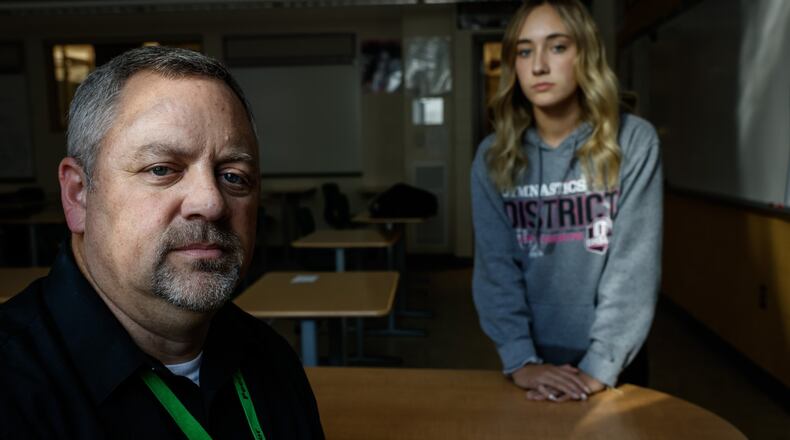Chloe: What do you remember about 9/11? And what did you do that day?
Matt: “What I remember about that day is teaching in the old high school building and standing in front of class when my mentor teacher came and stuck his head in door. He said, ‘There’s a plane that ran into the World Trade Tower and it’s on TV and it’s getting heavy coverage.’ And so, not knowing the extent of that, I finished my lesson for five or 10 minutes, and then we turned on the little tiny TVs that we had in the old building and we were watching what didn’t seem like that big of a thing yet. It was kind of an odd thing … The bell rang, we went to the next room. The teacher had the TV on in there, and we started watching it and obviously it didn’t take too long before it became obvious when the second plane hit that, oh my goodness, this is this big, big event and done on purpose, and they’re the big planes. Then all day long, I think we kept the TVs on and talked about it and watched stuff that was happening, and it was just surreal.”
Chloe: How did you feel seeing it unfold?
Matt: “At first it just seemed strange. And then once you knew it was an attack, then it was shocking. And the question was, even with the students, who would be doing this? I was aware of Osama bin Laden, and some of the things that had happened internationally and stuff up to then, but I don’t think it came into people’s minds immediately, in general, who would have been doing this, and why is this happening. It was a very historic thing to be getting attacked by people from outside your country, on your own soil. It just doesn’t happen. So it was shocking. And then I had to kind of try to help the students put it in perspective, when you don’t even know for sure what you’re seeing and understanding all the way. So it was a challenge through the day. But then, after that it was just like sadness, and just kind of sobering to realize what was happening and how much had gone on.”
Chloe: Do you think it changed the world kids like me are growing up in? If so, how?
Matt: “It definitely changed the world … You’re probably growing up and stuff doesn’t seem different to you, because it’s just normal. Like flights on planes, and the extra security, and things like that. And there’s probably a lot of things that all of us, even if we were around for it, don’t notice, like the extra powers of government to do surveillance to try to stop future attacks. I think a lot of people were fearful that we were going to get a lot more of that kind of thing. And by and large, we haven’t. There’s a lot of changes that are indirectly affecting everyone, and people in the next generation … Whether you know somebody or somebody in your family, or some of your neighbors, people that have gone off to one of the two wars that came from that event, that might affect people’s personal lives … There’s probably a lot of different ways that it affects the way our government does what it does, affects the types of politics we have … Depending on how much you’re paying attention and caring about the world around you, and how it’s functioning, you could probably see a lot of changes that came from it.”
Chloe: “What do you think future generations like mine, who weren’t alive when it happened, should remember or learn from it?”
Matt: “As a history teacher, I think there’s a lot of things we should learn from it. One of the feelings that is hard as a teacher to convey to students is the type of unity and, I guess you’d say nationalism, the way that people felt, by and large, that day. In my whole life, that’s the most unifying period that I’ve felt as a country. When basketball season started, almost to a person, people stood up for the national anthem and sang, and sang loud. At no time in my life prior to that, had people done that collectively … It hasn’t really been that way since. You can’t convey it to people who weren’t there, but the feeling of unity that people had, when they kind of bucked together to face something that was a threat to the whole country. And I think it’d be nice to have people realize that we all have that in us somewhere.”
About the Author

